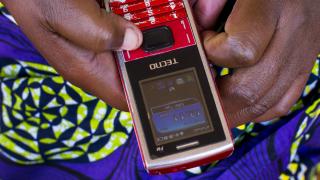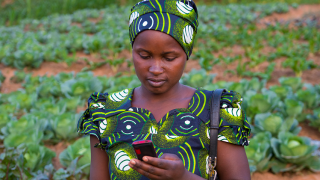Connected Without Contact
Innovating with Mobile Technology
Like many women in our Rwanda programme, a strict government lockdown in response to COVID-19 forced Jeanne to stay at home while suddenly shuttering her ability to make money for her family. Her training at Women for Women International was also put on pause, as the government banned public gatherings to prevent the spread of the virus.
Our team in Rwanda knew that women like Jeanne would still need support during the coronavirus crisis and looked to mobile phones for solutions. As a result of more reliable mobile phone service and women's ability to access it, mobile technology proved to be a viable answer to ensure women could continue to receive their monthly stipends, especially with banks closed. For Jeanne and her family, these mobile money transfers have been crucial to her family’s survival.
Not every woman has her own personal phone, sometimes relying on a shared mobile phone. Our staff worked around this obstacle by helping women secure personal SIM cards, giving women more ownership over their communication and money.

Mobile phones have also helped break the isolation of lockdown. Staff set up communication trees through Village Savings and Loan Associations. Jeanne said that she has put into practice lessons she learned about women’s solidarity and building effective social networks, motivating her to stay in contact with other women in the programme to support each other on a regular basis.
Mobile technology has also been impactful in many other countries where we work. In Iraq, where women we serve face one of the strictest lockdowns, mobile phones have been a lifeline. With many women having access to personal mobile phones, our team helped women set up group chats on social media and apps like Viber and Snapchat.
In a time when women are forced to stay at home amidst rising stress in the household due to economic and social strains, these groups along with phone calls from staff have proven incredibly important.
We’re just glad that we have found this way to stay in touch with women. We call them, we check up on them, we look for other service providers, try to help them and provide some service for them.
One of the biggest risks during crises like COVID-19 is domestic and gender-based violence, as stress sadly gets taken out on women. However, thanks to the networks created by our programme, our staff in Iraq was able to learn about cases of violence against women and respond. In Nigeria, communication trees helped our staff do the same.
In addition to providing women with support during these difficult times, our team continues to look for ways women can review lessons from the programme until training resumes.
The reality is that literacy is a barrier for many women we serve. Gender discrimination and poverty means many have a limited ability to read. In places like the Democratic Republic of the Congo and South Sudan, radio broadcasts have been one solution.
In Afghanistan, along with having set up communication trees, our teams are exploring ideas such as recorded audio messages, so women can continue receiving accurate, trustworthy health and hygiene information. With so many rumours that can misinform people about coronavirus, this knowledge can help many women protect themselves and their families, and help prevent the spread of disease in their communities.

Besides the impressive speed and way our staff has innovated to use mobile technology to continue reaching women, this period has been a testament to the deep connections that the Women for Women International programme helps women form. Women have shown care for one another during a time of hardship — but also for our staff!
Shan reported that women in the programme have actually called her and the staff to check up on how they are doing.
“What the programme does is it brings women together and they become a network of support to each other,” Shan said.
The swift support of our staff in shifting to mobile technology or radio programmes along with the support women show one another across distances provides us hope — a powerful resource in the face of crisis.
